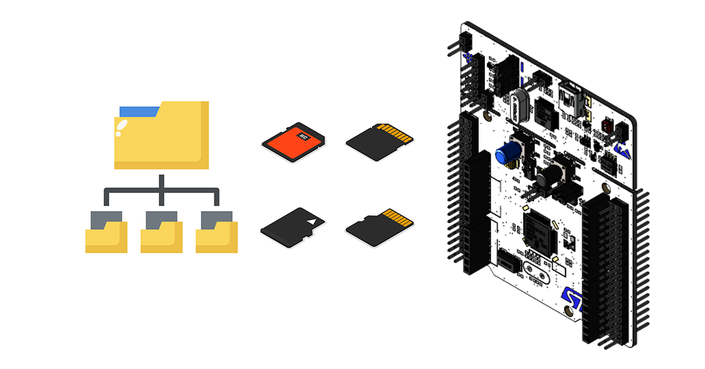
Mastering FileSystems and SD Card Drivers on Embedded Device
Unleashing the Power of Embedded Storage with FatFs and SD Card Integration
Watch Promo
Unleash the Power of Embedded Storage with FatFs and SD Card Integration with our comprehensive Embedded Files Systems and SD Card Drivers course.
This comprehensive course offers a unique and exciting opportunity to dive deep into the world of embedded file systems secure digital (SD) card storage. With a focus on the STM32 microcontroller, this course covers everything you need to know to master the implementation of file systems and secure digital (SD) card drivers.
Throughout the course, you will learn about the various types of storage media used in embedded systems and their relative advantages and disadvantages. You will also be introduced to the design considerations and optimization techniques for file systems in embedded systems, including file system allocation algorithms, file fragmentation, and file system security.
The highlight of this course is the hands-on approach to implementing the popular FatFs file system on embedded devices. You will learn how to configure the FatFs system, how to perform disk and file I/O operations such as creating files, reading files, writing different types of data including sensor data to files, how to troubleshoot and debug file system issues and much more.
With the flexible online format, you can study at your own pace, from anywhere in the world. Plus, we offer a 30-day money-back guarantee, so you can enroll with confidence.
Here's a sneak peek at what you can expect to learn:
- Introduction to embedded systems storage media: Provides a comprehensive overview of storage media used in embedded systems. The section begins by defining what storage media is and how it is used in embedded systems. It then covers the different types of storage media available, including Secure Digital (SD) cards, EEPROMs, and FLASH memory, and provides a comparison of these different types of storage media. This section is a great starting point for anyone who wants to understand the fundamentals of storage media and how it is used in embedded systems.
- Secure Digital (SD) Card Drivers: Provides an in-depth look at Secure Digital (SD) cards and their use in embedded systems. It covers the technology behind SD cards, their driver architecture, and the APIs and functions used to read and write data to these cards. This section also includes a hands-on programming component where you will learn how to implement a bare-metal SD card driver, giving you a practical understanding of how to integrate this technology into your embedded systems projects.
- Introduction to file systems: Provides an overview of file systems and their importance in embedded systems. Also covers the basic concepts of file systems, including the definition of file systems, the types of file systems, and the requirements of file systems for embedded systems.
- File system design and implementation: Focuses on the design and implementation of file systems in embedded systems. It covers the key design considerations that are specific to file systems in embedded devices, and how to optimize the performance of these file systems.
- File system allocation: Covers the topic of file system allocation, which is a crucial aspect of file system design and implementation. Begins with an introduction to file system allocation, followed by a discussion of different file system allocation algorithms, including the pros and cons of each method. Then delves into the issue of file system fragmentation, which can impact performance, and the strategies for minimizing it.
- The FatFs File system for Embedded Devices: This section of the course covers the usage of the FatFs file system. It starts by introducing the FatFs library and its purpose, followed by an overview of its key features and advantages. The section then covers FatFs configuration, including the options for Long File Name (LFN). The section concludes with a discussion on disk and file I/O, including the disk I/O interfaces and the different file system operations such as mount, open, read, write, and close.
Don't miss out on this opportunity to advance your career - enroll now!
Frequently Asked Questions
Your Instructor
EmbeddedExpertIO represents a vibrant collective dedicated to the mastery of sophisticated embedded systems software development for professionals.
Our core objective is to equip individuals and organizations with the indispensable skills to thrive in the swiftly evolving embedded systems sector. We achieve this by providing immersive, hands-on education under the guidance of seasoned industry specialists. Our ambition is to emerge as the favored learning platform for embedded systems development professionals across the globe.
